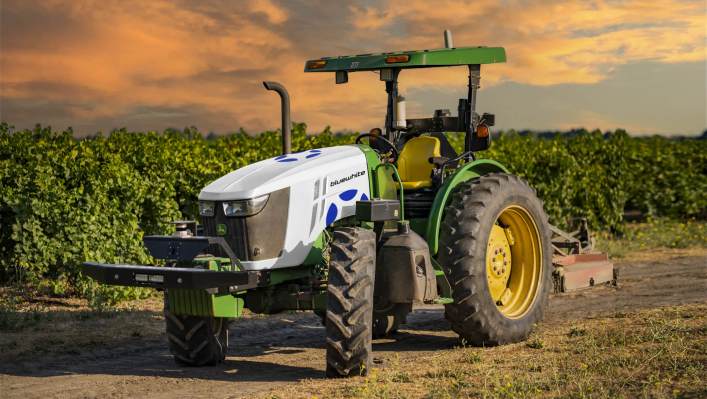Agriculture has a long heritage of being constantly disrupted by technology, an evolution that has continued to play out until today. In one of the latest developments, an Israeli startup called Bluewhite has picked up $39 million in funding to advance its own contribution to the field: autonomous robots that can be retrofitted to any tractor to operate it autonomously, which in turn are sold not as one-off products but as part of a bigger service play — robots-as-a-service.
The startup plans to use the funding to continue investing into R&D — specifically to bring more data features into its service stack (branded “Compass”) and to continue enhancing its autonomous hardware technology (branded “Pathfinder”), which today can be programmed to work across a wide range of field types and vehicles (Bluewhite builds and operates the whole stack).
The tech used today includes not just AI and computer vision on the hardware, but also AI-based algorithms to better understand what is being “seen” in the field that works alongside big data analytics to provide customers with dashboards and insights to better understand what is going on among their crops.
Bluewhite will also be using the funding to continue expanding in its current markets and to break ground in new ones. Bluewhite’s tractor robots have been seeing their strongest traction so far in the U.S., with an emphasis on California and Washington, where its customers range from small family farms to 20 of the biggest “permanent” (year-round) crop growers in the country. Cumulatively, its robots have covered 50,000 hours of autonomous farming activity across 150,000 acres.
The funding, a Series C, is being made at a valuation between $200 million and $300 million post-money, a decent jump on the $130 million valuation it had when it last raised in 2021. Insight Partners is leading the round, with new backers Alumni Ventures and LIP Ventures, and previous backers Entrée Capital, Jesselson, and Peregrine Ventures also participating, alongside some unnamed investors.
Its aim, said CEO and co-founder Ben Alfi, is to target one of the biggest gaps in the agriculture industry today — a lack of people who want to work in it to meet the demands of the market — and to do so in a way that improves the working conditions of those who do, but without expecting customers to wholesale strip out existing assets.
“Labor, labor, labor: it is the biggest need,” he said in an interview. But not to be overlooked are the overheads of running a farm outside of labor. “We want to maximise the existing assets people have.”
The average cost of operating a legacy tractor annually, he said, is around $100,000 when you account for the maintenance, the fuel, and other related costs. But while some farmers are gradually cycling in newer equipment that might be cost-effective or more modern (or both), the rate of replacement is, at best, only around 10% on average, even for the most successful agribusinesses. The Bluewhite solution is meant to address those realities of farm economics. It can be set up in one day — it comes as what he describes as an “IKEA kit” that is sent to a local service center to be fitted — to reduce the amount of downtime for a vehicle. And afterward customers take the service typically on a five-year contract. Tractors fitted with Bluewhite’s robots can still be operated by humans in situations where they might still need to be.
Bluewhite is part of a bigger wave of startups and larger agricultural equipment businesses that are increasingly eyeing up the opportunity of applying more technological advances to the world of farming to improve efficiency and meet the challenges of modern times, be they issues with labor, climate change, or new demands for food at lower prices. Others in the same space include Farm-ng, Growmark, Aigen, Monarch and Iron Ox building their own take on robotic farmers, and Alphabet business Mineral.ai, which appears to be focussing more on the data science that can be gleaned from the field (so to speak).
But tractors alone appear to have very strong prospects. Bluewhite cites forecasts from researchers that project a market worth $11.5 billion for autonomous tractors by 2030.
“Particularly in these challenging times, we’ve been excited to see Bluewhite defy the odds and successfully deploy its solution while also raising this next round of funding so it can continue to scale,” said Daniel Aronovitz, a principal at Insight Partners, in a statement. “The combination of Bluewhite’s unique autonomous technology and incredible team have led the company to rise above the pack, and we’re thrilled to be working with them as they move into this next critical phase.” Aronovitz is now also a member of Bluewhite’s board.
